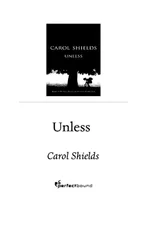Then, to my surprise, I catch sight of my mother ahead of me in the crowd, and it pleases me to see that she has put on her best cardigan and her white shoes and that she is holding forth loudly to someone or other, saying, “Letting go of the past means embracing the present.” Someone else is saying, “The seeds of childhood grow on mysterious parental soil,” and an old man in a baseball cap is muttering, “We are the sum of our collective memories.”
The crowd grows even larger, and again and again I find myself pushed to the end of the line. I realize it will be hours before my turn comes, and so I pull a book out of my knapsack to help while away the time. It is a new book of poetry, untitled and anonymous, which appears to be a celebration of the randomness and disorder of the world. We are solitary specks of foam, the poet says, who are tossed on a meaningless sea. Every wave is separate, and one minute in time bears no relationship to the moment that precedes or follows it.
I read on and on, and soon forget about the people crowding around me and reading over my shoulder. The bowling green fades into dimness, as do the benches and the magnolia tree and the gravel path, until all that’s left is a page of print, a line of type, a word, a dot of ink, a shadow on the retina that is no bigger, I believe, than the smallest violet in the woods.
SOME OF MEERSHANK’S WITTIEST WRITING was done during his wife’s final illness.
“Mortality,” he whispered each morning to give himself comfort, “puts acid in the wine.” Other times he said, as he peered into the bathroom mirror, “Mortality puts strychnine in the candy floss. It puts bite in the byte.” Then he groaned aloud—but only once—and got straight back to work.
His novel of this period, Malaprop in Disneyfield , was said to have been cranked out of the word processor between invalid trays and bedpans. In truth, he wept as he set down his outrageous puns and contretemps. The pages mounted, two hundred, three hundred. The bulk taunted him, and meanwhile his wife, Louise, lingered, her skin growing as transparent as human skin can be without disintegrating. A curious odor, bitter and yellow, stole over the sickroom. Meershank had heard of the odor that preceded death; now he breathed it daily.
It was for this odor, more than anything else, that he pitied her, she who’d busied herself all her life warding off evil smells with scented candles and aerosol room fresheners. Since a young woman she’d had the habit of sweetening her bureau drawers, and his too, with sprigs of dried lavender, and carrying always in her handbag and traveling case tiny stitched sachets of herbs. He had sometimes wondered where she found these anachronistic sachets; who in the modern industrial world produced such frivolities?—the Bulgarians maybe, or the Peruvians, frantic for hard currency.
Toward the end of Louise’s illness he had a surprise visit from his editor, a vigorous, leggy woman of forty who drove up from Toronto to see how the new manuscript was coming along. She came stepping from her car one Monday afternoon in a white linen jumpsuit. Bending slightly, she kissed Meershank on both cheeks and cried out, “But this is extraordinary! That you can even think of work at a time like this.”
Meershank pronounced for her his bite-in-the-byte aperçu, very nearly choking with shame.
He was fond of his editor—her name was Maybelle Spritz—but declined to invite her into his wife’s bedroom, though the two women knew and liked each other. “She’s not strong enough for visitors,” he said, knowing it was the smell of the room he guarded her from, his poor Louise’s last corner of pride. “Maybe later.”
He and Maybelle sat drinking coffee on the veranda most of the afternoon. The weather all week had been splendid. Birds sang in the branches of Meershank’s trees, and sunlight flooded the long triangle of Meershank’s side lawn. Maybelle, reading slowly as always, turned over the manuscript pages. Her nails were long and vivid. She held a pencil straight up in her hand, and at least once every three minutes or so she let loose a bright snort of laughter, which Meershank welcomed like a man famished. He watched her braided loop of auburn hair and observed how the light burned on the tips of her heavy silver earrings. There was a bony hollow at the base of her neck that deepened, suddenly, each time another snort was gathering. Later, at five o’clock, checking his watch, he offered gin and tonic. For Louise upstairs he carried cream of celery soup, weak tea and an injection for her hip, which the visiting nurse had taught him to administer.
“Are you feeling lonely?” his wife asked him, turning on one side and readying herself for the needle. She imagined, rightly, that he missed her chatter, that her long days spent in drugged sleep were a deprivation. Every day she asked the same question, plunging him directly into blocky silence. Yes, he was lonely. No, he was not lonely. Which would please her more? He kept his hand on her discolored hip and mumbled the news—testing it—that Maybelle Spritz was thinking of coming for a visit.
She opened her eyes and managed a smile as he rearranged the pillows. He had a system: one pillow under each knee, one at the small of her back and two to support her shoulders. The air in the room was suffocating. He asked again, as he did every day, if he might open a window. No, she said, as she always did; it was too cold. She seemed convinced that spring had not arrived in its usual way, she who’d always been so reasonable.
Downstairs Maybelle stood in the kitchen drinking a second gin and tonic and heating up a noodle pudding she had brought along. She had occasionally been a dinner guest in Meershank’s house, but had never before penetrated the kitchen. She set a little table on the veranda. There was a breeze, enough to keep the mosquitoes away for a bit. Knives and forks she discovered easily in the first drawer she opened. The thick white dinner plates she found stacked on a shelf over the sink. There were paper napkins of a most ordinary sort in a cupboard. As she moved about she marveled at the domesticity of the famous, how simple things appeared when regarded close up, like picking up an immense orange and finding it all thick hide on a tiny fruit. She wondered if Meershank would ask her to spend the night.
————
They had only once before shared a bed, and that had been during the awful week after Louise’s illness has been diagnosed.
The expression terminal , when the doctor first pronounced it, had struck Meershank with a comic bounce, this after a lifetime of pursuing puns for a living. His scavenger self immediately pictured a ghostly airline terminal in which scurrying men and women trotted briskly to and fro in hospital gowns.
The word terminal had floated out of the young doctor’s wide pink face; it was twice repeated, until Meershank collected himself and responded with a polite nod. Then he put back his head, counted the ceiling tiles—twelve times fourteen—and decided on the spot that his wife must not be told.
The specialist laced clean hands across flannel knees and pressed for honest disclosure; there were new ways of telling people that they were about to die; he himself had attended a recent symposium in Boston and would take personal responsibility …
No. Meershank held up his hand. This was nonsense. Why did people insist that honesty was the only way of coping with truth? He knew his wife. After thirty-five years of marriage he knew his wife. She must be brought home from the hospital and encouraged to believe that she would recover. Rest, medication, country air—they would work their healing magic. Louise could always, almost always, be persuaded to follow a reasonable course.
Читать дальше












